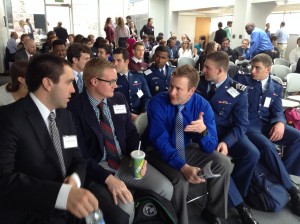[Best_Wordpress_Gallery id=”147″ gal_title=”Model Arab League”]
Html code here! Replace this with any non empty text and that's it.
“I was sweating it a little,” said the group’s faculty adviser, Islamic studies Professor James Toronto, of the awards ceremony. “We were about even with the University of Utah until the last council (awards were announced).”
Toronto attributed the final award for BYU — “outstanding delegation” representing Saudi Arabia — in part to two BYU students — Ryan Hughes and Ryan Newell — being willing to switch roles to council chair at the last minute.
“I just really like seeing the negotiating process of people who really have different ideas about things and then seeing how people’s ideas gradually come together,” said Hughes, who won the award for outstanding chair. “It gives you real-world experience that you don’t usually get at school.”
Lucy Walter, a Middle Eastern studies major who helped represent Saudi Arabia, said the new people — with new opinions — made the process that much more challenging. She said the diplomatic process pushed her limits, as she had to compromise her ideas to find solutions with students from around the Western United States.
“The other advisers always ask me what we do to make BYU so good,” Toronto said. “I think our students are just natural diplomats.”
BYU took its largest team ever, with a conspicuous group of 20 students, up from last year’s 14.
Middle Eastern studies major Ryan Nebeker said getting personal experience with diplomacy changed how he understands politics, even though the competition was a simulation. “It’s a really different thing when you’re in the room with people,” Nebeker said. “It’s not just policy in play, it’s personality.”

This was the third year since a long hiatus BYU has competed in Model Arab League, which functions similarly to Model United Nations. BYU will go to the national competition in Washington, D.C., April 10–12.
Experiences like Model Arab League enable students to “try out” different career opportunities for majors like Middle Eastern studies, said Arianna Mueller.
The interaction with students also studying the Middle East was a great benefit from the competition, said Middle Eastern studies major Ted Ellsworth, adding that experiences like this are what completes an education.
Some groups, including last year’s national champion Model United Nations delegation from BYU, meet regularly for two semesters to prepare for these competitions. The Model Arab League group met for one hour weekly for about two months. Toronto said this means the students get most of their preparation from BYU’s strong Middle Eastern studies program, their time living in the Middle East on study abroad and “their ingenuity and their intelligence.”
Toronto said with all the academic benefits of these competitions, winning is “icing on the cake.”
“Believe me, I wouldn’t volunteer for this if I didn’t think that it was valuable for the students,” Toronto said.
BYU Awards
Outstanding delegation: BYU representing Saudi Arabia
Outstanding delegates: Joshua Balleck, Kelsey Scott, Gary Crofts, Dan Jones, Mayranush Gevorgyan, Ryan Nebeker, Ryan Hughes (chair)
Honorable mentions: Erik Summers, Ethan Thompson, Ben Smith, Scott McLelland, Logan Weist, Lucy Walter, Ryan Newell (chair)




